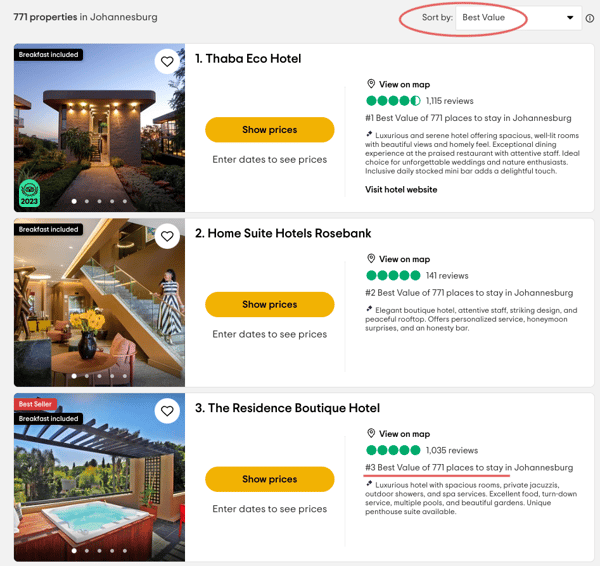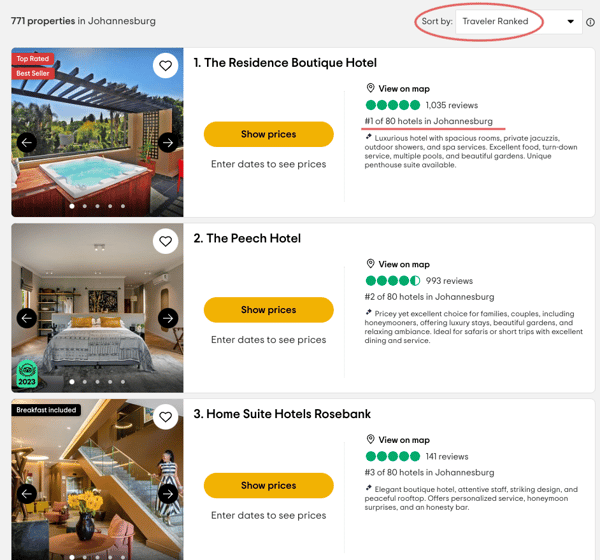With 490 million monthly users reading 1 billion Tripadvisor reviews and traveller opinions, Tripadvisor has more than earned its place in the hospitality industry. You can’t afford to not show up on your guest’s next search, but how do the Tripadvisor rankings and review scores work, and what can you do to leverage your listing to your advantage?

Tripadvisor has adapted over the years, introducing new ways of ranking and sorting properties. All aim to improve the guest's experience when searching for hotels. With various algorithm updates, Tripadvisor has finetuned the weighting of various factors such as location, booking popularity, pricing, availability, bubble ratings, and the Popularity Index (more on this later) when determining properties’ scoring and ranking.
Tripadvisor's Popularity Index
The ranking of each property is heavily influenced by the Tripadvisor Popularity Index, a carefully crafted algorithm that aims to predict, based on scores and consistency of past reviews, what level of experience a property is likely to provide to a guest.
The purpose of the Popularity Index is to present travellers with the best options first, ensuring that their experience of the Tripadvisor website is useful and positive. It is important to note that the bubble rating is only one of the factors which influences the Popularity Index. Your popularity index is calculated from three factors:
Quality of reviews: The bubble rating given by travellers in reviews and is reflected in a single score of 1-5 based on a summary of both the written reviews and the overall score given by your guests.
Quantity of reviews: The number of reviews your property has
Recency of reviews: How recently your reviews were submitted
As it stands, the Popularity Index values consistency in score, recency and volume of reviews, it is, therefore, possible for hotels with a lower bubble rating to sometimes rank above hotels with a better bubble rating. Exactly how each of these factors is weighted, only Tripadvisor knows, but as an astute hotelier, you should focus on improving all of them.
The Popularity Ranking algorithm is designed to provide a statistical measure of confidence about the current experience at a business. As we accumulate more reviews on a business over time, we have more insight into the potential experience consumers can expect. Once we've reached a critical mass of reviews, we're able to more accurately predict that business's ranking.
– Tripadvisor
It is also important to note that Tripadvisor’s Popularity Index takes into account other related businesses when determining a property's ranking, so your property will be ranked in comparison to the other similar properties in your geographical area. Therefore, this ranking is always in flux, as one property moves up or down in ranking it will affect all of the other properties in the area, similarly as businesses receive reviews it can change the ranking of not just their property but yours as well.
Additionally, depending on which sorting option is selected, rankings can vary considerably. There are currently three main ways of sorting properties:
Ranking and sorting variations
1. Best Value
The default sorting option is what Tripadvisor calls “Best Value”. This ranking algorithm collates a multitude of data points available to Tripadvisor including review ratings, pricing, availability, and the specific user’s preferences and recent activity on the site. This sorting option is very detailed and personalised and can deliver different ranking orders to different users. Sorting results by “Best Value” will bring up all properties that match the user's search criteria, regardless of type (i.e. Hotels, Lodges, B&Bs & Inns etc.).
Only Tripadvisor knows the exact nuances of this algorithm, but what we do know is that the ranking here is influenced by the hotel's bubble rating and the Popularity Index, and can therefore be improved to an extent by working on the Popularity Index factors. Tripadvisor also offers paid promotional options for listing your property first, before the actual ranking list starts.

2. Traveller Ranked
Tripadvisor users can also choose to sort results by “Traveller Ranked”, which will rank properties according to the Tripadvisor Popularity Index. This ranking is based on the ratings given to properties by travellers in individual reviews, as well as the volume, recency, and consistency of reviews. This score is the best indicator of how your guest experience compares to your competitors in the eyes of guests.
It is important to note here that the default setting on Tripadvisor’s “Traveller Ranked” sorting will only include hotels. However, users can filter by property type to discover “Traveller Ranked” properties in each category – Hotels, Lodges, B&Bs & Inns, and so on. There are occasionally discrepancies between the total number of properties in a category on the Tripadvisor website and on their app. This appears to be because the browser version excludes properties with no reviews, while the app includes these in the total count.

3. Distance to city centre
Sorting by “Distance to city centre” will sort the listings by proximity to the centre, taking into account availability data Tripadvisor gets from booking partners.
Improving your Tripadvisor ranking
In a nutshell, and according to Tripadvisor itself, “Popularity Ranking is based on user feedback, consistently collecting new, high-quality reviews — that reflect levels of service and value that meet expectations — is the best way for businesses to improve their position over time.”
In other words, to improve your overall rating and ranking you need to look at improving all three of the popularity index factors: quality of reviews, the quantity of your reviews, their recency and their consistency.
QUALITY
Unfortunately, there are no easy digital tips and tricks for this one, the quality of reviews is determined by good old-fashioned hospitality – how happy your guests are with the experience they are receiving. While there is no surefire way to guarantee top reviews, you can use your historical guest feedback to ensure that your future guests have the best possible experience. This can be in the form of fixing small hiccups in individual rooms or making significant upgrades based on consolidated guest feedback.
In addition to improving your service offering based on insights from guests, hoteliers should also be mindful of setting the correct expectations. Often, less-than-satisfactory reviews stem from a discrepancy between what the guest expects and what they experience. These gaps can be minimised by looking at guest feedback, adjusting marketing efforts to accurately depict what guests can expect, and targeting your hotel marketing to the customer groups which best suit your property’s offerings.
QUANTITY
One of the challenges hoteliers face is getting these satisfied, but not overwhelmed, customers to leave reviews. People post reviews about experiences that they find exceptional, whether that be exceptionally good or exceptionally bad, while acceptably pleasant experiences go unreported.
The number of reviews you get can be bolstered by implementing some simple tools and tricks (but make sure you don't fall on the wrong side of the rules of online review sites). You need to ensure that you’re asking every guest to leave a review after their stay, and giving them as many opportunities to do so as easily as possible.
This can be in the form of a QR code positioned around the hotel, or an email reminder designed to prompt the guest to leave you a review. According to a BrightLocal study, “65% of consumers left reviews in response to requests from a business”, so we can see that just asking helps generate reviews. Ideally, you should make it as simple as possible for guests to voice their feedback and to automatically load this onto Tripadvisor. For instance, thanks to our Platinum Partner status, GuestRevu surveys can include an embedded Tripadvisor review section, which allows guests to post a review to Tripadvisor without logging in or even being a member of the site. This has led to many of our clients seeing a significant increase in the volume of thier Tripadvisor reviews.
RECENCY
The older a review is on Tripadvisor the less weight it carries in your overall scoring, so hoteliers need to have a strategy to actively garner feedback from their guests. Having a Tripadvisor account but not having an online reputation management strategy can often lead to more frustration than joy from the online platform. Whereas those properties who actively request feedback often find that their online reputation can significantly boost their bookings and ultimately their bottom line.
Consistency
These three elements; quality, quantity and recency, work together over time to shape a business's Popularity Ranking. To put it simply, if you consistently receive positive reviews, your ranking will be higher than a property with a mix of glowing and less favourable feedback. Moreover, recent reviews, especially when there's a high volume of them, hold more significance than those from years prior. So, maintaining a positive and current reputation is key to climbing up the ranking ladder.
Your ranking isn't all that matters
You might be ranked first in your area or you might be ranked hundredth, but remember that people, not numbers, stay at your hotel. You have to be a person as well, someone who is part of the conversation, you have to respond to your reviews.
This does not mean only responding to those reviews which sing your praises, although a ‘Thank-you’ and ‘Hope to see you again’ obviously go a long way in showing appreciation. The real test will come in managing your negative reviews – and manage you must because should you hide or ignore them, you’re going to miss out on the 85% of TripAdvisor users who say that a properly managed response to a negative review actually improves their impression of the establishment.
Make sure you engage, frequently and thoughtfully. As mentioned, management responses are invaluable, but so too is current content. Make sure your listing content is up-to-date and consider seasonal adjustments to ensure you are really appealing to travellers who are thinking about booking right now. Photos are extremely important, especially of the inside of your property so it’s worthwhile investing in some great shots.
— Sally Davey, former Head of Industry Relations at TripAdvisor
With a sound reputation management strategy you should be able to put your best foot forward on Tripadvisor and benefit from the increased exposure, boosted popularity and ultimately improve your bottom line.




